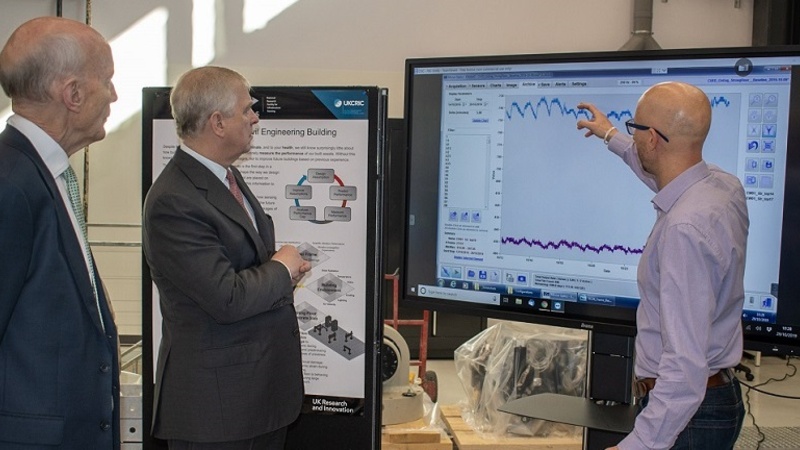
The Head of CSIC, Professor Lord Robert Mair and academics and researchers from the Department of Engineering welcomed The Duke of York when he visited the UK Collaboratorium for Research on Infrastructure and Cities (UKCRIC) National Research Facility for Infrastructure Sensing (NRFIS) at the new Civil Engineering Building, on the West Site of the University of Cambridge, on 29 October.
The Duke of York supports a number of science and technology organisations, including being a Patron of the Institution of Civil Engineers (ICE), to promote and raises awareness of British expertise to support initiatives which attract increased investment into UK science, technology and engineering.
Lord Mair said: “We are delighted to welcome The Duke of York to the National Research Facility for Infrastructure Sensing. Housed in the new Civil Engineering Building, and part of the UKCRIC portfolio of collaborative research and innovation facilities, NRFIS marks a significant step in enabling the UK to design, build and maintain infrastructure which is more resilient, adaptable and sustainable. NRFIS is a resource where academia and industry can engage in research to optimise the country’s infrastructure base and support the UK to be a leader in the field of smart infrastructure.
“The UK needs to invest in infrastructure and its associated services which are so important to the people using it every day. We welcome HRH to NRFIS and the new Civil Engineering Building which will host collaboration between industry and researchers to improve, protect and grow the UK infrastructure base.”
During his tour of the new NRFIS facilities which focus on the research and application of advanced sensor technologies to optimise the design, construction, and maintenance of the UK's existing and future infrastructure, HRH met a number of academics and researchers who presented a range of innovative research projects and deployments.
Dr Nicky de Battista, Research Associate at the Centre for Smart Infrastructure and Construction (CSIC) gave an introduction to the instrumentation of the new Civil Engineering Building, which features six sensor packages from the roof to the foundations. The sensors are an integral part of ongoing CSIC research developing technologies to assess the performance of the new building against the predictions made during design. This information can be used to better understand performance and inform future design.
HRH visited the CSIC lab where Dee Dee Frawley, CSIC Programme Manager, explained the collaborative way CSIC works with industry, associated organisations and policy to accelerate implementation of research outputs that deliver greater efficiency in asset design and performance, a low-carbon society, sustainable urban planning and management and improved productivity. The new laboratory facilities enable CSIC to extend its programme of research projects, industry deployments, training and workshops.
Paul Fidler, CSIC Computer Associate and Dr Xiaomin Xu, CSIC Research Associate, presented an award-winning rockfall warning system using fibre optic technology implemented at Hooley Cutting, near south London. Collaborating with Network Rail, CSIC researchers designed and trialled two bespoke systems for the 30m-deep cutting slope to provide an early warning of slope failures on the network.
Many CSIC Investigators and colleagues also presented research projects to The Duke. Professor Janet Lees introduced HRH to the Structures laboratory and current research including demonstration of concrete elements that mitigate CO2 emissions. Professor Campbell Middleton, Director of the Laing O’Rourke Centre for Construction Engineering and Technology, and Dr Ioannis Brilakis, Director of the Construction Information Technology laboratory, spoke about the drive to digitise infrastructure and demonstrated a range of technologies including digital twin virtual reality.
The visit concluded with three fast-paced and visual presentations: Sakthy Selvakumaran, Researcher at the Laing O’Rourke Centre for Construction Engineering and Technology, presented her research on the satellite monitoring of infrastructure; Dr Timea Nochta, CSIC Research Associate, presented the Smart City Project developing a city-level digital twin; and Ioanna Papanikolaou, a Future Infrastructure and Built Environment (FIBE) PhD researcher presented on nature-inspired infrastructure.
Commending The Duke of York for his interest in and visit to NRFIS, Lord Mair said: “As an ambassador for technology and engineering, His Royal Highness appreciates the significant opportunities offered by advancements in digital technologies. As we face global challenges, including climate change, population growth and rapid urbanisation, it is the work of civil engineers which will provide solutions to these challenges helping to change the lives of millions of people for the better.”
The Duke was presented to Professor John Dennis, Head of School, Dr Shui Lam, Secretary of the School, Professor Richard Prager, Head of the Department of Engineering, Professor Simon Guest, Head of Civil Engineering, and Professor Giulia Viggiani, NRFIS Academic Lead. HRH was accompanied by HM Lord-Lieutenant of Cambridgeshire, Mrs Julie Spence OBE QPM, and Lord-Lieutenant’s Cadets, Cadet SSgt Eleanor Phipps and Leading Cadet Matthew Smith, and presented to Councillor Mac McGuire, Chairman of Cambridgeshire County Council, and Councillor Gerri Bird, Mayor of Cambridge.
